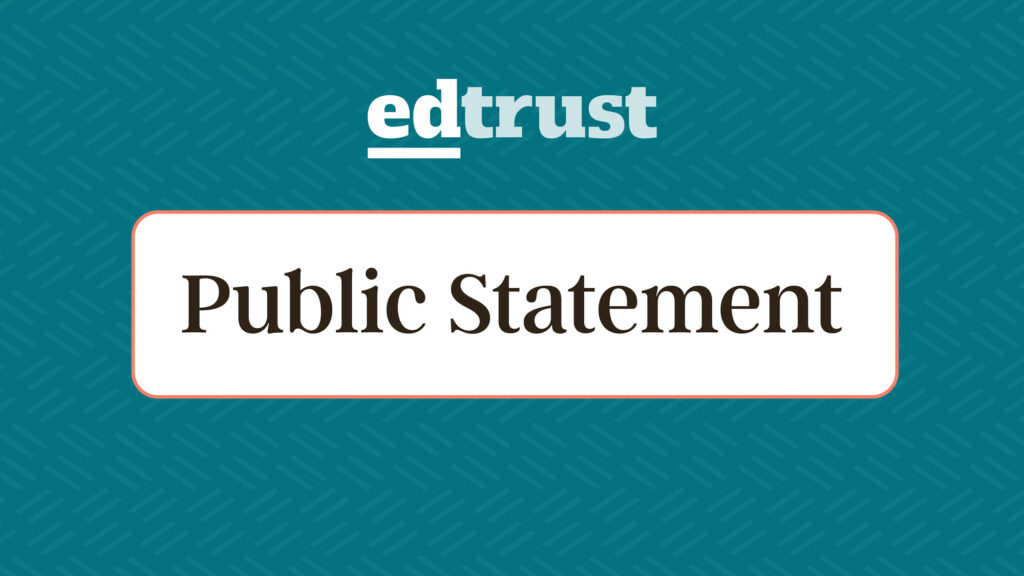Joint Statement on House Budget Reconciliation Bill
Civil rights and education advocacy organizations released the following statement on the House budget reconciliation bill and the harmful impact it will have on students

As organizations committed to ensuring that all students have access to a high-quality education, we are deeply concerned with the budget reconciliation legislation that passed the House on a party-line vote. The legislation will devastate state budgets and funding for education, eliminate health insurance and food assistance for millions of students and their families, and have harmful, long-lasting impacts on public schools. We strongly urge the Senate to reject this bill.
This bill will drive painful budget decisions, shifting the cost burden to already overextended state and local governments. Because state and local funds provide the vast majority of funding for our nation’s nearly 100,000 public schools, these cuts will inevitably result in fewer instructional supports, reduced student services, and the loss of critical school personnel—especially in communities with the fewest resources. Many schools are already losing needed funding as a result of this Administration’s policies, and more cuts will follow if this bill is passed.
The legislation also includes a private school voucher scheme that would provide a tax benefit to wealthy individuals who donate to scholarship-granting organizations and effectively divert $20 billion in federal funding that could support public school students. This is alarming for a number of reasons: First, this proposal would further undermine public education at a time when the Trump administration is simultaneously attempting to dismantle the U.S. Department of Education and cut funding for public schools, both of which will result in tens of thousands of teachers losing their jobs and limited or reduced services for underserved and at-risk students including those who are homeless, learning English, or have disabilities. Second, the proposal prohibits any oversight or accountability regarding where and how these funds are used, and whether students are receiving a quality education. Third, the program would likely benefit well-off families instead of those most in need of additional support. Similar state voucher programs have shown again and again that they disproportionately benefit wealthy families and students already enrolled in private schools who can pay the difference between a voucher and private school tuition. Fourth, private school voucher programs enable discrimination, as private schools can discriminate in admissions and hiring, and students do not have the same rights, protections, and services at private institutions as they do in public schools. And lastly, rural communities and largely rural states will likely benefit the least from these tax dollars. In rural areas, one-third of students live more than ten miles from a private school, and many areas have no private school options at all. In poll after poll, when given a choice between increasing funding for public schools or funding private school vouchers, voters – across age, race, political affiliations, and geography – overwhelmingly support public schools.
The House legislation also cuts hundreds of billions of dollars from Medicaid and makes changes to the Affordable Care Act marketplace, which will result in almost 14 million Americans losing their health insurance. Nearly half of all students in this country have access to health insurance through the Medicaid program. In addition to basic health insurance, Medicaid – the fourth largest source of funding for schools – provides critical funding to schools for nurses and counselors, physical and mental health programs, and supports for students with disabilities. In addition, the bill weakens food assistance by cutting nearly $300 billion from the Supplemental Nutrition Assistance Program (SNAP), which helps families afford groceries that enable children to learn and fulfill their potential. Further, these SNAP changes could result in millions of children losing access to school meals and going hungry, according to an analysis from the Urban Institute.
The House bill also hurts students and teachers by rolling back college affordability programs, student loan repayment options, and borrower protections. The legislation would cut Pell Grants and eliminate eligibility altogether for students enrolled less than half-time, eliminate subsidized undergraduate loans, and impose new limits on federal financial aid, reducing access to postsecondary education especially for students from low-income backgrounds. Beginning in 2026-27, the proposal would eliminate Grad PLUS loans for any student not currently enrolled. These loans are the primary source of financial aid for graduate degrees, including for teachers pursuing master’s degrees. The bill also includes provisions that would make loan repayment harder and less affordable, likely increasing the number of borrowers in default. Our postsecondary students will not only pay the price for this harmful bill–provisions that make higher education less affordable could also exacerbate the teacher shortage, negatively impacting our K-12 schools and students.
Students, families, communities, and schools would be significantly harmed by this legislation. As organizations working to ensure students, families, and communities have the education resources they need to be successful, we strongly urge all Senators to oppose this bill.
Sincerely,
AdvanceIllinois
Advancement Project
All4Ed
CASEL
Education Leaders of Color
Educators for Excellence
EdTrust
Families in Schools
Healthy Schools Campaign
Kids First Chicago
League of Education Voters Foundation
National Center for Learning Disabilities
National Parents Union
SchoolHouse Connection
StudentsFirstNY
The Center for Learner Equity
UnidosUS